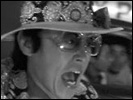Fall Guy
- Year
- 1982
- Original title
- Kamata Koshin Kyoku
- Japanese title
- 蒲田行進曲
- Director
- Cast
- Running time
- 109 minutes
- Published
- 12 April 2005



by John Behling
The English title Fall Guy is fitting - this is a film about a stuntman who takes several plunges for his movie star friend - but there's a clever touch of subversion in the less obvious Japanese title. Kamata Koshin-Kyoku refers to Shochiku studio's theme song. But this film about the production of a samurai epic on the Toei studio lot in Kyoto is hardly a fawning tribute to the world of cinema. It's a film by Kinji Fukasaku. Like the director's masterpiece, Battles Without Honor and Humanity, Fall Guy exposes the injustices visited on honest, hard-working men serving corrupt and undeserving bosses; all he has done is change the setting. In the place of low-ranking yakuza are stuntmen, the foot soldiers of the entertainment industry. In the place of Japan's criminal underworld is a movie set.
Although Fall Guy may be a leap for American audiences that know Fukasaku from the bloody fireworks of Battle Royale, his message - that a climate of violence and repression breeds only more violence - remains relevant in any part of the world, for any generation. And like always his kinetic, visceral style remains jaw-dropping and inspiring.
Yasu (Hirata), is one of mega-star Ginshiro's (Kazama) dotting lackeys, always trailing the cry baby diva with a stream of compliments. Ginshiro is starring in a samurai epic, but most of his energies go into winning a skirmish for close-ups with co-star and arch-rival Tachibana (Harada). Ginshiro turns to mug for the camera after every swing of his sword while the director (Kanie) writhes in agony.
Fukasaku himself had little tolerance for cry-baby actors. Before he made Battles Without Honor and Humanity, the studios churned out ninkyo films (a term that refers to yakuza films that emphasized the honorable disposition of their heroes) with stars like Koji Tsuruta and Ken Takakura. But Fukasaku needed actors who could express the anger he felt toward the world, actors like Bunta Sugawara, star of the Battles series. Fukasaku also enjoyed casting relatively unknown actors alongside stars and putting the lesser-known players in the spotlight. Here he casts mega-star Sonny Chiba as just another actor and newcomer Mitsuru Hirata as the star. (Although it's one of his first films, Hirata was no stranger to the role of Yasu, both he and co-star Morio Kazama perfected their roles in the highly successful stage version of Fall Guy.)
When Ginshiro's girlfriend Konatsu (Matsuzaka) becomes pregnant, the star is horrified that it could ruin his career. He pleads with Yasu to marry Konatsu and raise the son as his own. Without hesitation Yasu agrees. In order to support his new family, Yasu must work as a stuntman, taking hits, running from explosions, and leaping off buildings, while Ginshiro pouts about his waning fame and chases a young actress. The ever-happy Yasu bears all, always smiling even when his increasingly dangerous work leads to bandages and plaster casts.
Hirata is a perfect fit for Fukasaku's working-class everyman. The actor is able to bring levity to even the most extreme punishments he suffers at the hands of Ginshiro, always bowing and taking the abuse, always shuffling around his miniscule apartment trying to please Konatsu as best he can.
Ultimately, Ginshiro asks Yasu to take a fall that no stuntman in Japan will risk: a plunge down a 30-foot staircase. The staircase in question becomes the pivotal set for the film. Speaking through the film-within-a-film's director, Fukasaku launches into a tirade against the studio system. The set - only half-finished at this point - represents the short-sighted studio executives. They have no problem building a set three times higher than any staircase in the history of Japanese cinema, but no one is willing to take the plunge. They want to show violence, but in a glamorized, unrealistic way, and with no concern for the real dangers involved. In this case it could cost an innocent man his life.
Speaking of violence, even a comedy by Fukasaku has its share of shocking moments. Ginshiro rapes Konatsu in front of Yasu just to show him who's the boss. Late in the film Yasu finally explodes in a shocking rage that made me twist in my seat. But what's important is the context. Yasu is a product of a system that programs him to unquestioningly take abuse. His reaction, if not justifiable, is understandable.
It's this plea to put violence in context that makes Fukasaku relevant today. Seldom do we find a director so willing to disrupt the rules of conventional filmmaking in order to make a powerful, socially relevant film. This is, of course, the real 30-foot staircase that so few are willing to risk.